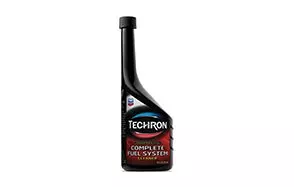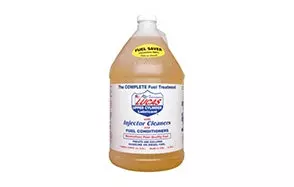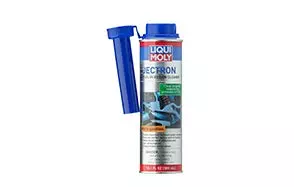- 1. Chevron Techron Concentrate Plus
- 2. Lucas 1-Gallon Fuel Treatment
- 3. Liqui Moly 2007 Jectron
- 4. Red Line Fuel Cleaner
- 5. STP Super Concentrated Fuel Injector
- 6. Royal Purple Max-Clean
- 7. Gumout High-Mileage Fuel Injector Cleaner
- 8. BG 44K Fuel System Cleaner
- 9. K100 Gasoline Fuel Treatment
- 10. B-12 Chemtool Fuel System Cleaner
Fuel injectors make or break your car’s ability to start. Considering all the elements your injector system faces every time you use your car, it deserves some TLC. These parts wear down, and, as they do, it impacts your whole fuel system. To address this, fuel injector cleaners add a chemical additive to the fuel that moves through the injectors. Injector cleaner uses a series of detergents and additives to remove built-on gunk, resulting in a cleaner burn and added fuel efficiency. No longer will your car sputter when you try to kick on the starter — fuel injector cleaners keep your engine quieter, improve responsiveness, and make your gas last longer.
That is, of course, provided you pick the best fuel injector cleaners for the job. Where mad science meets mechanics, finding the right formula is essential. Read on to check out the leading candidates, along with tips and tricks on getting the most out of your fuel injectors.
The Best Fuel Injector Cleaners
The Techron Concentrate Plus fuel treatment is a powerful product that cleans your entire fuel system. Chevron’s name is synonymous with superior power, and its fuel cleaner showcases that. Use this on any vehicle you have, including the engine on your boat, RV, etc. It restores lost power and acceleration.
This product will replenish your lost fuel economy and eliminate horrible firing issues—including loud and rumbling idling, hesitation, and problems with your spark plug on startup. If you’re in a rapidly changing environment, this protects your engine from negative cold startups, makes starting easier, and lasts for up to one year in your system.
It’s worth noting that only some small-scale effects show up right away, and it takes some time for this concentrated fuel injector cleaner to do its job. With that in mind, as long as your expectations are fair, this is a solid pick.
- Works on your entire fuel intake system, not just your injectors
- Designed to work on ATVs, dirt bikes, and boat engines as well
- Reduces idling issues and eliminates spark plug fouling
- Brand Chevron
- Model 65740
- Weight 20 ounces
Improves overall fuel economy
Treats as much as 15 gallons
Works for roughly 3,000 miles
Concentrated formula better for older rides
Only compatible with gasoline systems
Lucas is a leader when it comes to fuel and oil additives, and this formula provides a solution that cleans your engine block while it runs its course through your system. You can increase your fuel economy with this value-size, 1-gallon fuel treatment, which comes in an easy-to-pour bottle. It also lubricates your system while you clean it.
If your injectors are old, or you just want to prevent them from sustaining any more damage, Red Line is a go-to product. Essentially, it’s an all-in-one product that gives you the benefits of a fuel additive and the power of an oil additive, and it cleans your fuel injectors like a professional. It stands out from the crowd in that it comes in bulk. Unlike other models that give you a single-shot repair, this selection lets you plan over the long term.
Unfortunately, as a result of the bulk, you’re also faced with the issue of the product becoming stale. Once it’s exposed to oxygen and the dust in the air, you can expect it to lose potency over time. Since three ounces of this formula treats 10 gallons, you can expect to hold onto this fluid for quite some time.
- Increases life expectancy on pumps + injectors
- Cleans fuel intake system while lubricating
- Increases power while also increasing fuel economy
- Brand Lucas
- Model LUC10013
- Weight 8 pounds
Helps with low-sulfur issues
Prevents incomplete combustion
Comes with ample supply
Built as a tune-up not for repairs
Loses potency as it sits on shelf
Liqui Moly does much more for your engine than a standard injector cleaner. If you have problems during startup, such as rapid clicking or stalling, they’ll disappear once you add some Liqui Moly. It provides a better throttle response as well as smoother idling by eliminating minimal vibration and unwanted chatter from the engine.
Reasonably priced and available in 10.1-ounce bottles, Liqui Moly’s solution is great for older vehicles/engines. It’s a good way to optimize performance. Fuel injectors go through the paces, and they need a thorough cleaning now and then. You’ll notice an immediate performance improvement, and it can be used as a fuel additive afterward.
Despite the clear-cut benefits in terms of price and impact, this fuel injector is geared towards rides with catalytic converters. While it will work on a vehicle without one, you’d be both overdoing it and missing out at the same time.
- Thoroughly cleans combustion chamber
- Eliminates issues that occur on startup
- Much smoother idling after use
- Brand Liqui Moly
- Model 2007
- Weight 10.1 ounces
Excellent for cars with catalytic converters
Limits environmental pollution
Improves combustion efficiency
Geared towards newer cars
Can be too powerful if corrosion has taken effect
Won’t be as effective without the converter
Red Line is known for its oil and fuel additives, but it also sells other products you may be less familiar with. This fuel system cleaner optimizes an engine’s performance, which is useful if your system requires an in-depth cleansing. Red Line’s patented formula gives most users 100 percent efficiency the first time they use it.
Red Line’s formula cleans injectors, carburetors, and more while preventing corrosion and reducing the buildup of gum and varnish. It’s available in any quantity that you need, though it is useful as a single-shot treatment for your fuel injector system. Highly concentrated, this complete cleaner is built for use every 3,000 miles. Designed for gasoline vehicles, it’s an excellent way to go for full-system servicing.
Keep in mind that the “immediate” effect is not the full impact of the treatment. It does an impressive job clearing it out right away, but the actual results of the fuel injector cleaner don’t show for roughly a week.
- In most cases, 100 percent efficiency after the first clean
- Contains complete upper cylinder lubricant (synthetic)
- Two uses per bottle (use the full bottle if your vehicle has been neglected)
- Brand Red Line Oil
- Model RED60103
- Weight 15 ounces
Quick improvement in engine
Highly concentrated formula
Comes in easy-pour bottle
Doesn’t work on diesel rides
Synthetic lubricant vulnerable to cold
Works better as treatment than prevention agent
When you don’t have time to take apart your fuel injectors, you need a cleaner that you can add to your fuel tank. STP is designed to complement capless gas systems. It removes harmful deposits, so sediment and sludge don’t stand a chance.
This formula increases oil pressure and boosts city and highway fuel economy. In most cases, it can optimize performance by as much as three to four miles per gallon, and it’s great for any make or model. STP offers its solution in a 12-ounce bottle that is designed so that the liquid is easy to pour out.
However, the power of this formula is a double-edged sword: it performs optimally on systems with actual sediment buildup, but if that isn’t the issue, you’re adding in a chemical that can itself build up over time.
- Perfectly compatible with capless gasoline systems
- Works hard to remove sediment deposits and sludge around seals
- Powerful enough to be used as a fuel additive and still remove clogs
- Brand STP
- Model 78577
- Weight 11.2 ounces
Powerful fix for neglected engines
Once bottle for a single treatment
Takes guesswork out of mixing
Not meant for diesel vehicles
Isn’t suited as a preventative
Restores instead of maintains
Now is a good time to try Royal Purple if you’ve never used it. Royal Purple has been a go-to product for many people over the years because it delivers good results. When you use this product, you’ll eliminate stalling and hesitation issues as well as promote better fuel economy.
The Royal Purple Max Clean formula stays in your vehicle’s system for some time after use, upholding high-performance standards. Using it can increase your horsepower and decrease harmful emissions by up to 18 percent. Spending a little extra on this product pays off in the long run, especially when you consider the savings in terms of fuel efficiency.
Keep in mind that this updated formula is designed for more modern vehicles, so if your ride is an older model, you aren’t likely to see the full advantages of this formula. Those with new rides equipped with updated engine tech can reap the full benefits of this fuel injector cleaner.
- Prevents hesitation and stalling
- Upholds optimal performance long after use
- Improves your fuel economy, on average up to 3 percent or more
- Brand Royal Purple
- Model 11722
- Weight 1.25 pounds
Suitable for modern engines
Helps your spark plugs work longer
Stabilizes fuel sulfur contents
Not suited to older models
Better for low-mileage rides
Fuel economy benefits will vary based on fuel quality itself
Sometimes big things come in small packages, and that’s the case with this fuel injector cleaner from Gumout. It’s seriously potent and rises to the task. This fuel injector cleaner continuously lubricates your engine’s fuel system for months following application, which reduces the rate at which sediment and stubborn carbon deposits can form.
Gumout reduces emissions, maximizes fuel economy, and provides superior protection for multiple components of your engine block. It transforms your clogged injectors so they act brand new, as far as performance goes. Gumout is the ultimate preventive measure to extend the life expectancy of your injectors.
Affordable and easy-to-use, this injector might clean powerfully, but it lacks any kind of conditioning agent to stabilize the chemical mix down the line. It lacks the ingredient to treat seals, which is a common need for higher-mileage vehicles.
- The answer to supercharged and turbocharged vehicle issues
- Removes stubborn carbon deposits (on engines over 75,000 miles)
- Lubricates effectively to reduce sedimentary deposit buildup rate
- Brand Gumout
- Model 510013
- Weight 6 ounces
One bottle equals a single treatment
Quickly improves fuel efficiency
Works with all types of gasoline
Only effective on gas vehicles
Can counteract with non-Gumout additives
If you put a variety of fuel treatments, additives, or other products in your vehicle and you want to know whether the fuel system cleaner you choose will adversely react with these chemicals, consider using the BG 44K Fuel System Cleaner. Its unique formula is compatible with common fuel additives, alcohol-blended fuels, and other fuel system materials, so you don’t have to worry.
The 44K easily cleans not only your fuel injectors but also your combustion chambers and the valves on your engine, allowing it to breathe more efficiently and drawing the much-needed power from your fuel system to drive your wheels. Car enthusiasts testify that 44K can transform a car’s fuel system into a highly efficient mechanism, saving you gas and giving you the power you need from your engine.
This impressive formula gives you just about everything you need to condition and repair your fuel injectors. However, it comes at a hefty price point for a mere 11 ounces. While it can improve your ride significantly, it’s a service that is priced according to quality.
- Compatible with a variety of fuel products and additives
- Improves gas mileage, power output, and combustion quality
- 11-oz can good for 20 gallons of fuel
- Brand BG
- Model 44K
- Weight 11.2 oz
Includes detergents and additives
Drastically improves fuel efficiency
Works with all types of fuel
Comes with a heavy price tag
Only gives you a single use
Made out of natural ingredients, the K100 Gasoline Fuel Treatment is built to remove built-on sludge. It improves mileage to leave you with a smoother-performing vehicle. The result is a better response during deceleration and acceleration, thanks to the E-10 fuel separation phase. Prone to intermingling with water, this is the part that can choke up the system (similar to water droplets going down your trachea).
Improving the cleanliness of your system overall, it also helps you idle more smoothly. As a result, this is a great treatment for urban driving. When used regularly, it can help you better handle the ebbs and flows of traffic. Coming in an 8-ounce container, this treatment is effective if optimizing fuel efficiency is your focal point.
While this formula does exceptionally well in an urban setting, it falls short on the backroads or gravel and dirt areas. The key additive addresses water contamination as opposed to debris and particulates. Sure, it will have some impact, but it isn’t made for this situation.
- Works on high-octane systems
- Improves atomization of fuel
- Addresses fuel quality
- Adds substantial fuel efficiency
- Brand K100
- Model N/A
- Weight 8 ounces
Results in a smoother ride
Comes with a single-shot supply
Actively reduces water contamination
Tougher against cold than hot
Loses potency if not used in full
Bottle makes pouring tricky
If you are looking for a serious scrubbing, the B-12 Chemtool Fuel System Cleaner is an excellent place to start. It is built to take on old and weathered fuel systems and disperse the formula evenly. By using this approach, it strips away all of the particulates and debris in your engine.
It’s ideal for cars with fuel residue, whether from gum or varnish. Compatible with all types of vehicles, including cars, boats, and all-terrain vehicles—the result is a return to proper function. When used in conjunction with a good treatment to condition seals and valves, as well as high-grade fuel, it’s a great pick.
Instead of using a conditioner or detergent, this formula brings in heavy scrubbing molecules. It’s great if this will be used on an older car, but it might over strip newer rides and lack the conditioning agents needed to protect it from further damage.
- Reduces emissions from incomplete combustion
- Improves overall fuel economy
- Facilitates proper spray pattern
- Relies on a solvent-based solution
- Brand Berryman Products
- Model 0116
- Weight 1.08 pounds
Powerfully cleans caked-on debris
Reduces frequency of preventative maintenance
Helps preserve older vehicles
Spray not an additive
Spreads out instead of focused results
Only works with certain vehicles
Best Fuel Injector Cleaners Buying Guide & FAQ
Finding the best fuel injector cleaner means knowing your engine, the process of combustion, and how fuel injectors play into the picture. Understanding how it works is essential to picking out the right candidate for your ride. It depends on the mileage, environment, vehicle, and even driving habits. The good news is that once you break it down, it’s pretty simple, so let’s delve into the world of fuel injector cleaners.
How Do Fuel Injectors Work?
Fuel injectors themselves, in terms of function, are pretty straightforward once you get down to brass tacks. They use an incredibly tiny nozzle to force the fuel into a mist. It mixes with air to give you the combustion that makes cars move. Of course, what sounds simple is the result of detailed engineering and precise machining.
What Fuel Injectors Do
Your fuel injector is a work of art. It is composed of a variety of components that work together to deliver very precise amounts of fuel into your engine.
Located near the top of the fuel injector near the fuel rail is the fuel filter basket which effectively traps larger particles present in fuel from passing through and clogging the injector’s pintle and seat. The injector body holds the different internal components of the injector together. The coil winding is what pulls the injector pintle up and away from the seat.
The pintle is like the gate valve of the fuel injector. When lifted by the coil winding, it exposes a gap between it and the seat. This gap is where fuel passes through. Now, do understand that the pintle doesn’t really move that much — only by a few thousandths of an inch. The seat is where the pintle rests when not raised by the coil winding. It forms a seal around the pintle so that fuel will not pass through. Together the pintle and seat are the fuel injector’s core elements as they determine the rate of flow of fuel as well as the spray pattern of the fuel.
Lastly, there’s the pintle cap which holds an O-ring, forming a seal and protecting the rest of the fuel injector from heat generated by the engine.
How Fuel Injectors Get Clogged Up
As gasoline or diesel fuel runs through the entire fuel system, carbon deposits naturally are left behind. Just like the drain in your kitchen sink sometimes gets clogged with food particles, so too do intake valves and combustion chambers get clogged with carbon deposits. The type of fuel you use can also impact how clean your fuel system is. Lower quality fuels often are mixed with water, which can rust the inside of your fuel system, leading to reduced fuel efficiency and degradation of the entire fuel system over time.
How to Clean Dirty Fuel Injectors
Fuel injectors need maintenance, and that means adding a fuel injection cleaner roughly every 3,000 miles. Provided you choose the best fuel injector cleaner for the job, it will keep your engine running smoothly. By reducing carbon buildup and adding precision to the combustion process, it enables your engine to work with better efficiency. Even better, it’s an easy task, no matter how new you are in the world of car upkeep
What do I Need to Clean My Injectors?
You need the following:
- The best Fuel injector cleaner for your vehicle
- Fuel pressure gauge
- Hose for attachment to fuel injector and rail
- U-tube
Nothing else is needed to do this on your own, though this is assuming you have basic tools on standby in case you encounter any other issues while attending to the fuel injectors. This is the perfect time to run a visual diagnostic on your vehicle and make a shortlist of maintenance tasks you need to complete, so you won’t be cleaning your injectors for no reason.
What does a fuel injector cleaner do?
While all fuel injector systems are ultimately looking to achieve the same goal, there’s a time and a place for which each formula is best suited. It all comes down to the chemical solution in the formula: a series of additives that dissolves the carbon deposit without corroding the actual fuel injector. Every company holds its materials very close to the chest, with Chevron citing all ingredients other than petroleum distillates as ‘Trade Secret.’ However, if you look at some less established companies like Lubri-Care, you can see ingredients including trimethyl benzenes, Stoddard solvent, and naphthalene.
All these chemicals, or molecular relatives, are common to fuel injector cleaners—it’s about striking the right balance between them. The benzene-based molecule is the solvent, while Stoddard refers to a mixture of hydrocarbons. Naphthalene is used to construct plastic, so it works with the petrol contents to remain gentle on the hardware. Taken together, a fuel injector cleaner is a chemical formula that mixes with your fuel. It flows through your car’s system while you drive; and, while it moves around, it de-clogs and restores fuel efficiency.
How Clogs Form and Fuel Injector Cleans
The fuel, the proverbial life-blood of your car, carries with it all the essentials, plus some trace carbon deposits it drops along the way. On a small scale, it’s a little issue, which is why you only need to do the upkeep every 3,000 miles or so. However, if left too long, much like arterial deposits, your carbon deposits will find friends, growing and adding bulk over time, physically impeding the movement of your fuel. Unable to work correctly, it will take more gas to get the same combustion, thus lower fuel mileage. As it progresses, you’ll lose the ability to accelerate properly, hear an awful engine knock, or even lose power. Of course, the severity of the issue is relative to the severity of the buildup. So, if you tackle it at the first sign of a problem, you’ll be much better off.
Consider the buildup as layers of issues: the fewer layers of detriment there are, the more easily the chemical treatment can do its work. If there are more layers of grime, it won’t do the trick quite as well. Preventative maintenance may sound like a mechanic’s buzzword, but it’s quite literally the best way to keep your car in good condition. Letting a good fuel injector solvent and conditioner work its mechanical magic once in a while can save you so much expense and inconvenience down the line.
When Should I Use a Fuel Injector Cleaner?
Provided you make an attempt, it’s kind of hard to go wrong when applying fuel injector cleaner. Some mechanics will tell you that your ride can run up to 15,000 miles on one fuel injector cleaner session. However, if your vehicle is older or you deal with tougher conditions, it’s recommended you use it at the 3,000-mile marker, but if your car is telling you otherwise, listen to it. The best thing about fuel injector cleaner is that it makes its need known through nuisance noises and driving inconveniences.
It all depends on driving conditions, the age of your car, and the quality of the fuel you’re using. In terms of driving conditions, if you are decelerating and accelerating more frequently or deal with a lot of hills, you naturally incur more wear and tear. This is significantly increased by towing vehicles since it adds strain to the whole system. Plus, the older the vehicle gets, the more fuel it will consume and the more injector cleaner it needs. New cars get much better fuel mileage and much slower wear, requiring more infrequent treatments. Another consideration is the grade of fuel you use. It might cost you a bit more at the pumps, but less particulate in your gas gives your fuel injectors fewer particles with which to contend.
Ultimately, if you want to improve fuel efficiency and are tackling general maintenance, you can use a small number of additives frequently. Some go weekly, while others opt for every other day—it all depends on your car’s condition. However, if you’re looking to tackle the damage that’s already been done, look for a more potent option to use every few months. If you find the issue recurring, aim for every three months. In conjunction with this, if you’re driving an older ride, you’ll want to treat it annually to a blast of carbon removal. Be sure that all the chemicals you use are compatible with one another if you are going off-brand for your yearly treatment.
How do I Know if I Have a Clogged Fuel Injector?
There are a few ways to tell whether or not you have bad fuel injectors. These are the most obvious signs that you need to clean your fuel injectors:
Lowered Fuel Economy
If you have a digital meter in your car that displays your current MPG, pay attention to it at least once per ride. If you’re usually traveling the same routes, such as heading to and from work each day, you’ll get a firm understanding of what your MPG should be, both in and out of traffic, on and off of the highway. When you notice that there’s a significant decrease, such as 3-4 less MPG on your average, it could be an indicator of fuel economy problems.
This isn’t exclusive to fuel injector issues. Lower gas mileage can be a result of spark plug misfiring, bad air filters, incorrect tire pressure, and more. You shouldn’t immediately assume that your fuel injectors are the problem, but you also shouldn’t rule it out.
Forcing Your Engine
If you can feel that your engine doesn’t want to start, that you’re having issues every time you hop in the driver’s seat, you could have clogged injectors. Your injectors release a mist of gasoline, and when one or more aren’t firing properly, it gives unbalanced results. You should be able to hop in the car, twist the key, and be on your way with no worry.
Not Firing on All Cylinders
That phrase got its name from this issue; when your cylinders aren’t firing properly, you can hear it. Whether you have 4, 6, or 8 cylinders, you’ll be able to hear it. If you’ve recently opened up your hood and can visibly see gasoline on your spark plugs, you definitely have a clogged fuel injector.
How to Use a Fuel Injector Cleaner in Seven Easy Steps
After reviewing the layout of your specific make and model engine in your user’s manual, you should get everything ready and prepare to get your hands dirty. It’s recommended to wear gloves during this to avoid gasoline/oil absorption through your skin.
1. Disconnection
Start by disconnecting the fuel pump from the fuel injectors. This will require you to use a U-tube to ensure that gasoline returns to the tank, or the fuel return line. Some vehicles will have a different way to go about this depending on your make and model.
2. Disconnect the Pressure Regulator Vacuum Line
Normally, this is found slightly above your fuel injectors, though it will vary depending on your make and model. Be careful to keep the vacuum line perfectly intact upon removal, and lean it gently over the side of the hood.
3. Connection
Use that hose you have sitting by; connect it to the fuel pressure test port, and secure it tightly. Ensure there is no exposure to fuel of any kind by revisiting these steps and ensuring all parts are clear. Fuel injector cleaner is flammable; use caution.
4. Remove Fuel Tank Cap
This is a simple portion of the process — just be certain to put it somewhere you won’t lose it.
5. Turn the Car On
This is where it gets a little tricky. Turn your car on, but before you do this, be 100 percent certain that the fuel pump is off and then engage. The cleaner from your kit will begin to run through the engine. Within five to ten minutes, the engine will shut down when the cleaner has run its course. After this point, remove the cleaner tube.
6. Reconnection
Now, reattach the fuel pump power supply, as well as the pressure regulator hose, and then, reapply your fuel cap.
7. Quality Check
Turn your car back on to ensure the fuel injectors are reconnected and functioning properly. Drive it around the block for 5-15 minutes to really be certain. If you’re still noticing the same problems as before, and you know that your fuel injectors are clean as a whistle, you may need to replace them.
Easy Three-Step Process for Less Invasive Use
If you’re not too keen under the hood, or you just want to give your car a little TLC, you can still use some formulas of fuel injector cleaners without having to dissect an area of your car that you’re not familiar with.
1. Ensure Your Tank is Nearly Empty
You don’t want to dilute your solution in a full gas tank; ensuring that you have one gallon of gas or less is crucial to using this method.
2. Use the Appropriate Amount of Injector Cleaner
This is going to depend on the capacity of your gas tank. This is a good time to grab your owner’s manual and give it a read. Carefully read the instructions for the cleaner you’ve chosen, and match the recommended amount to the size of your tank.
3. Empty
Put the contents of your fuel injector cleaner of choice into the tank, add your regular fuel (this will push the cleaner through your injectors upon next startup), and you’re good to go.
Can Fuel Additives Help my Injectors?
Fuel additives can be helpful for numerous reasons, but if you’re storing your car for a long period of time — especially if you’re a proud owner of a vintage car that rarely comes out from under the tarp — you’ll want fuel injector additives.
These prolong the life expectancy of your fuel/oil, so you won’t have to worry about buildup or long-term corrosion. Fuel additives help keep your injectors lubricated and ready to go when you are.
Benefits of Fuel Injector Cleaners
It’s not only about keeping your engine working properly, and for longer, the impact of correctly applied fuel injector cleaner is widespread. States like California have begun to institute clean air standards, highlighting the need for a focus on both aspects of performance and efficiency. There’s a lot to keep in mind, but a few key benefits include:
Fuel Efficiency
First off, the key benefit of any fuel injector is in your pocketbook. Sure, you can think of it as a cost for the fluid — or you can consider it as savings on engine damage down the line and paying less at the pumps. If your fuel injectors are happy, you combust more evenly and you go through fewer supplies to get there.
Improved Burn Quality
Speaking of combustion, but eliminating harmful particulates and dealing with moisture, your fuel injector cleaner is making a positive impact on the environment. If you consider the average carbon output of a car per year, estimated at 4.6 metric tons of carbon dioxide, then it’s clear that every small bit helps. Consider that the best fuel injector cleaners brag about improving efficiency up to three percent, that’s a hefty reduction in your carbon footprint.
Reduced Friction Coefficient
Coming back to your engine, the improved burn definitely doesn’t hurt your engine. While it doesn’t work in the same manner as oil, the particulate and moisture differential caused by injector cleaner, helps smooth things out. When things move better, there’s less physical wear and tear, thus a longer lifespan.
Slows Wear and Tear
If you leave any kind of decay unattended, whether in your home, your car, or your person, it’s going to worsen. It’s a vulnerability that nature exploits, where entropy takes over and your clogging fuel injectors lead to a cascade of damage to the vehicle. You compensate for acceleration issues with the brakes, and it can snowball. Fuel injector cleaners are a good way to get ahead of any issues that may lie ahead.
Better Road Safety
Your fuel injectors control the mix of fuel and air used in combustion. That’s a lot of responsibility since it determines whether you get that smooth speed or a sputtering mess. Instead of getting honked at when you encounter idling issues at a green light, a fuel injector keeps things running smoothly.
FAQ
On their own, they cannot — if you find out you have a main line leak, you’ll have to have a professional mechanic patch it up or use oil additives (provided the leak is insignificant enough). The best fuel injector cleaners can help you locate a leak; during the cleaning process, when pressure builds and you’re already under the hood, you’ll be able to tell if there’s a leak, (especially if there’s gasoline on your spark plugs). Video
While the primary focus is on your fuel injectors, they do help with a once-over for other parts of your engine. If you take a moment and use a rag, these cleaners can eliminate grime built-up around your gas cap (which you will have to remove during the cleaning process). They’re also about more than just cleaning the section where your injectors propel mist. We would all like to believe that all fuel additives, which most of us use, do the trick in eliminating sediment buildup and slow down the production of grime. While they do help, it’s a fantasy to believe that they can do it all, and over long periods of time. Fuel injector cleaner is able to cut through those stubborn chemical buildups and sludge in the engine. It’s not going to be a preventative measure for very long, but eliminating that residue from your engine and its moving parts can give you immediate benefits that would otherwise elude you.
While some cleaners will have similar benefits to oil additives or fuel additives, they are not the same product. Additives are there to enhance your vehicle’s performance, while cleaners are simply optimizing the performance of your fuel by removing clogs from your internal parts. Think of them as two sides of the same coin – you want your additives to work properly, so you need clean injectors.
The average rate is every 3,000 miles, but there are some caveats. Consider that the standard car warranty projects an annual usage of 12,000 miles, which turns out to 1,000 per month. Put this in your calendar quarterly, provided you stick to these projected parameters. If your car’s engine is a bit worse for wear, then you can expect it to burn fuel more quickly. Once it hits 100,000 on the odometer, switch to a high-mileage cleaner and aim to do it a bit more frequently. If you notice symptoms of issues and it’s been a while since your last fuel injection treatment, take it as a sign to add some.
Carbon is the notorious element that’s leaving behind gunk on your system. As part of the gas you use, it interacts with the injectors and leaves traces behind. On a small scale, it’s no big deal, but over time, and without treatment, it will seriously compromise your ride’s function. To address this, just use a fuel injector cleaner that addresses carbon deposits.
It might not be what you want to hear, but if your go-to mechanic tells you to replace your fuel injectors, you’ll need to change them. Damage begets more damage—corrosion leads to further damage, and if this natural wear and tear process isn’t managed over time, it will become irreparable. It’s affordable and only needs to be done every 3,000 miles or so, so save yourself the expense of replacement with proper maintenance. Listen to your vehicle for telltale issues when starting, trouble accelerating, general sputtering, and an iconic knock, and take it as a sign to add some fuel injector cleaner. If you leave it too long, you’ll need to replace your fuel injector.
Fuel injectors, regardless of type, have only one common enemy – corrosion. This is because the internal components of fuel injectors are made from a variety of steel alloys. When exposed to the elements these can easily oxidize or rust. As soon as the fuel left inside the injectors dries out, the deposits that have built up inside can actually harden. This can lead to the pintle sticking to the injector’s seat. If this happens, you’ve got a very expensive piece of junk — inoperable. It may still operate, but what you’ll get is a leaky injector. As such, if you do decide to take out your injectors with the hope of putting them back in after some time, you need to store them properly. This can be done by removing any dirt or debris that is present both inside and outside the injectors. Spray all surfaces with the appropriate lubricant before putting these in a sealed container or plastic bag. Store this someplace where it’s cool and dry. <h3 style=”text-align: left;”><strong>Q: Is Sea Foam the same as a fuel injector cleaner? </strong></h3> Sea Foam is a brand that makes a lot of different products, including its clean fuel system cleaner and fuel injector cleaner. What they are most well known for is their Sea Foam Motor Treatment, which is one of the best fuel system cleaners on the market. The difference between their Motor Treatment products and fuel injector cleaners is that their Motor Treatment product is used throughout the entire fuel system in both gasoline and diesel engines. It works by liquifying any sludge, tar, or carbon deposits throughout the fuel system, making it easier to flush these contaminants out of the engine. As such, it pairs well with a fuel injection cleaner. Overall, using a fuel injection cleaner plus fuel system cleaner, like Sea Foam Motor Treatment, could significantly improve your vehicle’s performance.
There are mixed reports about whether an excessive amount of fuel injector cleaner can cause damage to your engine. Some say that it could lead to overheating in your engine, causing certain parts to become damaged by the heat. Others say that some professional mechanics flush an entire fuel system by running a system cleaner and stabilizer without any gasoline at all. Given how extreme these two examples are, it’s safe to say that you won’t cause any damage to your engine if you make sure to follow the instructions on the bottle. Generally speaking, one bottle of fuel treatment is enough for one tank of gas.
You can put fuel injector cleaners into a full tank of gas, though make sure to check the instructions on the bottle before doing so. It is generally advised to add fuel system cleaners to a nearly empty tank of gas so that the chemicals can fully mix with the fuel as you fill up your gas tank. Just a few gallons of fuel in the gas tank would be sufficient to add the cleaner to.
It is recommended to use a fuel system cleaner every 3,000 miles for most gasoline engines. This will keep your engine clean, increase fuel efficiency, and improve the vehicle’s performance overall. For daily commuters, this could be anywhere from every three months to every six months. No matter how frequently you drive, though, it’s safe to use fuel injector cleaner every 3,000 miles to 5,000 miles.
Some of the best fuel injector cleaners can be used both on gasoline engines as well as diesel engines. Some, however, are more specifically designed for a certain type of fuel. For example, the Chevron with Techron Concentrate Plus Fuel System Cleaner works well with all types of vehicles, from cars to motorcycles to trucks and more. However, it is not meant to be used with diesel engines. This is because a fuel system cleaner designed for only one type of fuel will have a specific chemical formula to address exactly the kinds of deposits created by the type of fuel it’s targeting. So if you want the best fuel injector cleaner for your car, then find one that is specifically designed to work with the type of fuel that you use.
Our Top Pick for the Best Fuel Injector Cleaner
After careful consideration, we’ve named the Chevron Techron Concentrate Plus as the winner of this roundup. For starters, it’s from a proven brand with a track record of success with all types of engines. The chemical itself is powerful, able to address built-on issues and protect your engine from further damage. It shows immediate results, clearing any congestion, and, after a whole week of use, it can seriously improve the way your vehicle performs.
Sources
- How Often Should a Fuel Injector be Cleaned?, Do It Yourself
- How to Prevent Engine Deposits, Know Your Parts






















